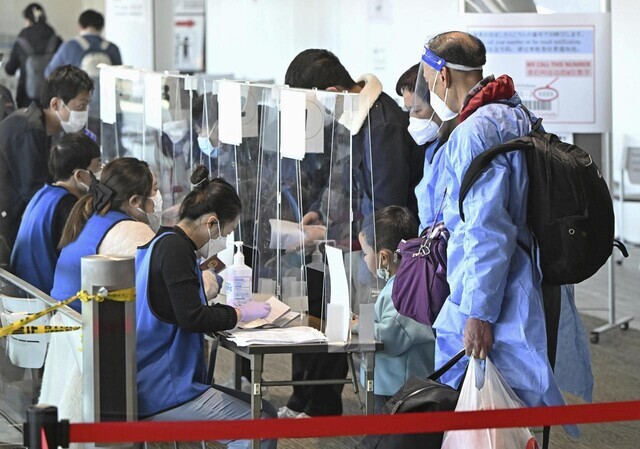hankyoreh
Links to other country sites 다른 나라 사이트 링크
[Editorial] China must be transparent on domestic COVID-19 situation

The Chinese government cited Korea’s “discriminative inbound restrictive measures” as its rationale for the temporary suspension of short-term visas for Koreans on Tuesday.
With an explosive increase in the number of COVID-19 cases in China, many countries have taken measures to strengthen quarantine restrictions against Chinese travelers, and China is choosing to take its first retaliatory measure by targeting South Korea.
This bodes ill for South Korea-China relations, which are already on unsteady ground.
The Chinese Embassy in South Korea announced that they would stop issuing visas and that the situation would be altered “depending on the cancellation of South Korea’s discriminative inbound restrictive measures on China.”
This highlights that this suspension is part of reciprocal measures to the South Korean’s government’s decision to make COVID-19 tests mandatory for inbound travelers from China on Dec. 30 and the suspension of the issuance of short-term visas until January 31.
Given South Korea’s high level of exchange with China and the fact that it’s the only country in the world that has stopped issuing visas to China, the move appears to be an intentional one being implemented to set an example.
This move immediately followed a phone call between the respective foreign ministers of South Korea and China, Park Jin and Qin Gang, on Monday. In the phone call, Qin expressed concern over South Korea’s restrictive measures.
This response from China is excessive and unreasonable. In January 2020, when COVID-19 spread from Wuhan, China, to all over the world, China imposed a full entry ban on all foreigners in March 2020 even though the Korean government imposed no such ban on Chinese travelers.
The Chinese government should also remember that when China adopted the “zero-COVID” policy and mandated compulsory quarantining for all overseas arrivals, South Korea did not take any retaliative measures of the same nature.
It's also worrying to see Beijing denouncing as “unscientific and politicized” the measures that South Korea and various other countries have adopted out of concerns over the current spread of COVID-19 in China. Despite experiencing a massive increase in cases since abruptly abandoning its “zero-COVID” policies on Dec. 7, the Chinese government has not calculated or disclosed precise figures on the numbers of infections or deaths.
PCR testing of international passengers arriving from China has shown a cumulative positive rate of 17.5% (Jan. 2–9) for the virus. In one case, a Chinese passenger who tested positive refused isolation and fled after arriving through Incheon International Airport.
Under these circumstances, we hope China will recognize that its actions only stand to hurt relations with South Korea further and make the decision to walk its measures back.
It needs to pay heed to the lessons learned in our two sides’ relationship from the kind of unilateral diplomacy it has practiced with approaches like the retaliatory measures in response to the Terminal High Altitude Area Defense (THAAD) system deployment in 2016.
The South Korean government, for its part, should work proactively to resolve any conflicts and misunderstandings and find a solution through diplomacy.
Please direct questions or comments to [english@hani.co.kr]

Editorial・opinion
![[Column] Samsung’s ‘lost decade’ and Lee Jae-yong’s mismatched chopsticks [Column] Samsung’s ‘lost decade’ and Lee Jae-yong’s mismatched chopsticks](https://flexible.img.hani.co.kr/flexible/normal/500/300/imgdb/original/2024/0512/3017154788490114.jpg) [Column] Samsung’s ‘lost decade’ and Lee Jae-yong’s mismatched chopsticks
[Column] Samsung’s ‘lost decade’ and Lee Jae-yong’s mismatched chopsticks![[Correspondent’s column] The real reason the US is worried about Chinese ‘overcapacity’ [Correspondent’s column] The real reason the US is worried about Chinese ‘overcapacity’](https://flexible.img.hani.co.kr/flexible/normal/500/300/imgdb/original/2024/0510/5217153290112576.jpg) [Correspondent’s column] The real reason the US is worried about Chinese ‘overcapacity’
[Correspondent’s column] The real reason the US is worried about Chinese ‘overcapacity’- [Editorial] Yoon’s gesture at communication only highlights his reluctance to change
- [Editorial] Perilous stakes of Trump’s rhetoric around US troop pullout from Korea
- [Guest essay] Preventing Korean Peninsula from becoming front line of new cold war
- [Column] The state is back — but is it in business?
- [Column] Life on our Trisolaris
- [Editorial] Penalties for airing allegations against Korea’s first lady endanger free press
- [Editorial] Yoon must halt procurement of SM-3 interceptor missiles
- [Guest essay] Maybe Korea’s rapid population decline is an opportunity, not a crisis
Most viewed articles
- 1[Column] Samsung’s ‘lost decade’ and Lee Jae-yong’s mismatched chopsticks
- 2Seoul’s plan to adopt SM-3 missiles is like wanting a sledgehammer to catch a fly
- 3Yoon rejects calls for special counsel probes into Marine’s death, first lady in long-awaited presse
- 446% of cases of violence against women in Korea perpetrated by intimate partner, study finds
- 5S. Korea “monitoring developments” after report of secret Chinese police station in Seoul
- 6Behind-the-times gender change regulations leave trans Koreans in the lurch
- 7Japan says its directives were aimed at increasing Line’s security, not pushing Naver buyout
- 8Yoon voices ‘trust’ in Japanese counterpart, says alliance with US won’t change
- 9US expert says THAAD can’t distinguish between real and decoy warheads
- 10Korea sees more deaths than births for 52nd consecutive month in February